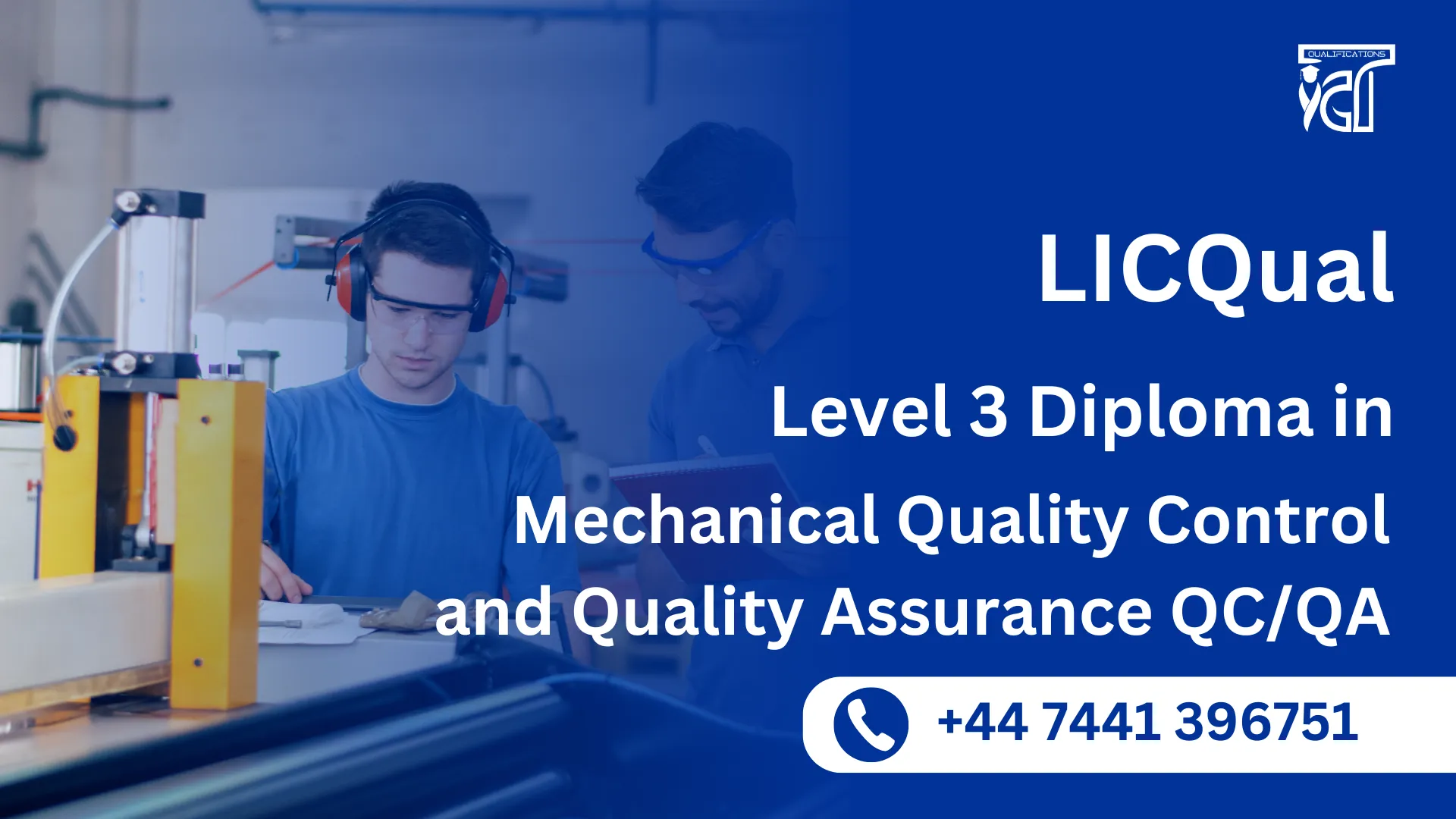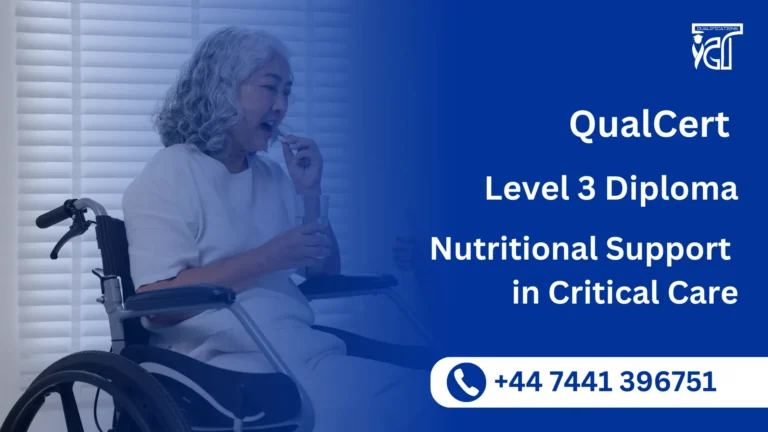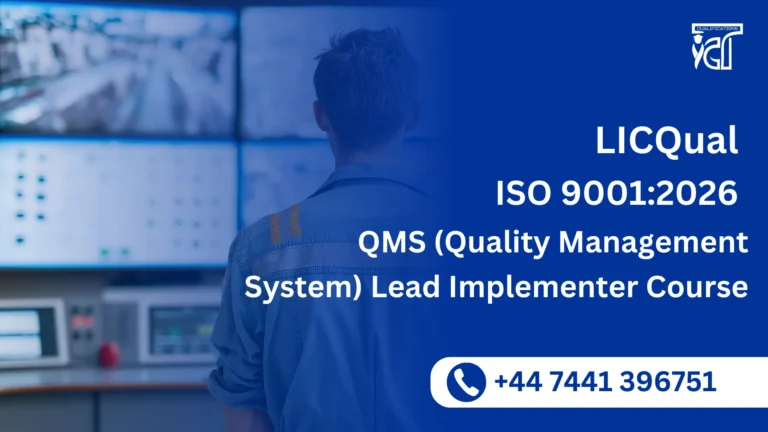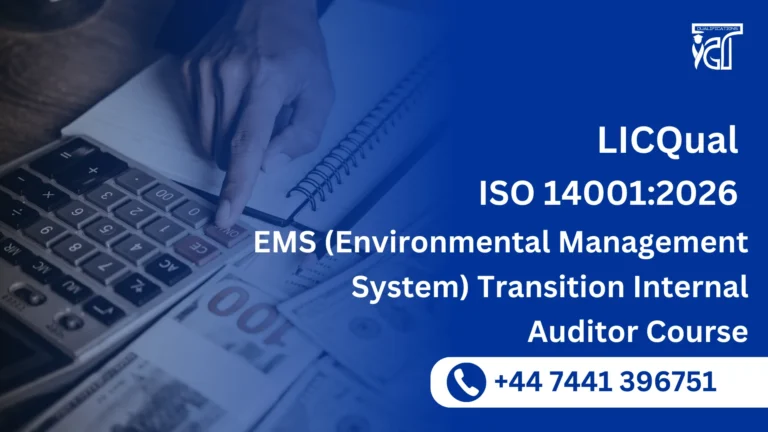Quality is the cornerstone of successful engineering—especially in the high-stakes world of mechanical systems and manufacturing. Whether you’re involved in fabrication, production, or mechanical maintenance, the ability to ensure compliance, precision, and safety is critical.
The LICQual Level 3 Diploma in Mechanical Quality Control and Quality Assurance (QC/QA) is designed for individuals seeking to build foundational knowledge in mechanical quality systems. This qualification provides practical insights and technical competencies for those aspiring to work or progress in mechanical quality assurance roles across various industrial sectors.
This internationally recognized diploma offers comprehensive training in the principles and practices of mechanical quality control, tailored to meet the needs of entry-level technicians, supervisors, and junior QA professionals. The program introduces learners to essential QC/QA tools, procedures, and documentation aligned with global mechanical engineering standards.
The course uses a practical, assessment-based model that allows learners to complete assignments at their own pace, reinforcing real-world application.With full online delivery, the program is ideal for working professionals, international students, or those pursuing a career transition.
The LICQual Level 3 Diploma in Mechanical Quality Control and Quality Assurance (QC/QA) provides essential knowledge and practical training for those starting or developing a career in mechanical quality management. With its industry-aligned curriculum, global recognition, and flexible format, this diploma sets the stage for a successful and sustainable future in engineering quality.
LICQual level 3 Diploma in Mechanical Quality Control and Quality Assurance QC/QA
Following are the mandatory units of LICQual level 3 Diploma in Mechanical Quality Control and Quality Assurance QC/QA
| Unit Ref# | Unit Title | Credit | GLH |
| LICQ2200167-1 | Fundamentals of Mechanical Quality Control | 10 | 40 |
| LICQ2200167-2 | Quality Assurance Systems and Standards | 10 | 40 |
| LICQ2200167-3 | Inspection Techniques and Tools | 10 | 40 |
| LICQ2200167-4 | Process Control and Optimization | 10 | 40 |
| LICQ2200167-5 | Non-Destructive Testing (NDT) Methods | 10 | 40 |
| LICQ2200167-6 | Documentation and Reporting for Quality Control | 10 | 40 |
GLH (Guided Learning Hours) and TQT (Total Qualification Time) are terms commonly used in vocational qualifications to help define the amount of time a learner is expected to spend on their studies.
1. GLH (Guided Learning Hours)
GLH refers to the number of hours a learner spends being directly taught, supervised, or supported during their course. This includes the time spent in activities such as:
- Classroom instruction
- Practical workshops
- One-on-one tutoring or mentoring sessions
- Online learning sessions with tutor support
In other words, GLH represents the time that learners are actively engaged with their instructors or learning activities.
2. TQT (Total Qualification Time)
TQT represents the total amount of time a learner is expected to invest in completing a qualification, including:
- GLH (Guided Learning Hours): Time spent on direct learning, as explained above.
- Self-Directed Learning: This includes time spent on independent study, research, assignment completion, preparation for exams, and any other work the learner does outside of direct teaching hours.
TQT is a broader measure that includes all the time required to achieve the qualification. It helps learners and employers understand the overall commitment required for the qualification.
Key Differences Between GLH and TQT:
- GLH focuses on direct learning with guidance or supervision.
- TQT includes GLH as well as independent study time and other learning-related activities.
Example:
If a qualification has a TQT of 600 hours and a GLH of 250 hours, it means the learner should spend 250 hours in direct learning (classroom, online, or tutor-led sessions) and 350 hours on independent study or research.
By the end of this diploma, learners will be able to:
Unit 1: Fundamentals of Mechanical Quality Control
- Understand the basic principles and concepts of mechanical quality control (QC).
- Explain the importance of QC in mechanical manufacturing and maintenance processes.
- Identify common mechanical defects and their impact on product performance.
- Differentiate between preventive, corrective, and predictive quality control approaches.
Unit 2: Quality Assurance Systems and Standards
- Understand the purpose and components of a quality assurance (QA) system in mechanical processes.
- Identify key international standards for quality assurance (e.g., ISO 9001, AS9100).
- Explain the role of QA in achieving compliance and maintaining consistency in mechanical systems.
- Develop a basic QA plan for a mechanical project or product.
Unit 3: Inspection Techniques and Tools
- Recognize the importance of inspections in ensuring mechanical product quality.
- Identify and use common mechanical inspection tools (e.g., micrometers, calipers, gauges).
- Apply inspection techniques to measure tolerances and detect deviations in mechanical components.
- Demonstrate the ability to interpret inspection data and report findings effectively.
Unit 4: Process Control and Optimization
- Understand the role of process control in maintaining mechanical quality standards.
- Analyze the factors affecting mechanical process performance and output.
- Implement statistical process control (SPC) techniques to monitor and improve processes.
- Optimize mechanical processes to minimize waste and enhance product quality.
Unit 5: Non-Destructive Testing (NDT) Methods
- Understand the principles and applications of non-destructive testing (NDT) in mechanical QC.
- Identify and differentiate between various NDT methods (e.g., ultrasonic testing, radiographic testing, magnetic particle testing).
- Apply appropriate NDT techniques to inspect mechanical components for defects.
- Evaluate the effectiveness of NDT in ensuring the structural integrity and performance of mechanical systems.
Unit 6: Documentation and Reporting for Quality Control
- Recognize the importance of accurate documentation in mechanical quality control.
- Develop and maintain comprehensive quality control records and reports.
- Apply best practices for writing clear, concise, and actionable QC reports.
- Utilize documentation to support continuous improvement initiatives in mechanical QC processes.
Benefits of the LICQual Level 3 Diploma in Mechanical Quality Control and Quality Assurance (QC/QA)
1. Globally Recognized Qualification
Awarded by LICQual, this diploma is internationally respected and valued by employers across mechanical, manufacturing, and industrial engineering sectors.
2. Ideal for Entry-Level Professionals
Perfect for beginners and early-career technicians, this Level 3 diploma provides a solid foundation in quality control practices tailored specifically to mechanical systems and processes.
3. Career-Ready Practical Skills
Learn how to:
- Use mechanical inspection tools
- Interpret technical drawings
- Conduct dimensional checks and quality assessments
- Report non-conformities and suggest corrective actions
These are immediately applicable in real-world job roles.
4. Boosts Employability in Industrial Sectors
Graduates can pursue QC/QA roles in industries such as:
- Mechanical manufacturing
- Automotive and aerospace
- Oil & gas
- HVAC systems
- Heavy engineering and fabrication workshops
5. 100% Assignment-Based – No Exams
This diploma follows a practical, assignment-driven assessment model, making it accessible to learners who prefer hands-on application over theory-heavy exams.
6. Flexible Online Study
Designed for global learners and working professionals, this course can be completed online at your own pace, allowing you to balance work and study effectively.
7. Supports Further Education and Progression
Successful learners can progress to higher-level qualifications such as:
- LICQual Level 4 or Level 5 Diplomas in Quality Control
- ISO 9001 Internal Auditor Training
- Technical Diplomas in Mechanical or Industrial Engineering
8. Enhances Professional Credibility
Holding a recognized diploma in QC/QA demonstrates your commitment to quality, safety, and process improvement, increasing your professional value in any mechanical or production environment.
9. Industry-Relevant and Up-to-Date
The curriculum reflects current industry standards and best practices, ensuring learners stay competitive in today’s evolving mechanical and engineering sectors.
10. Pathway to Supervisory Roles
Equips learners with the skills to eventually grow into roles such as:
- Quality Control Technician
- Mechanical QA Assistant
- Production Quality Supervisor
- Compliance and Inspection Officer
This diploma is ideal for:
- The LICQual Level 3 Diploma in Mechanical Quality Control and Quality Assurance (QC/QA) is ideal for aspiring mechanical engineers who wish to specialize in quality control and assurance within the mechanical engineering sector.
- LICQual Level 3 Diploma in Mechanical Quality Control and Quality Assurance (QC/QA) is designed for technicians and professionals currently working in manufacturing, production, or mechanical maintenance who seek to formalize their knowledge and expertise in quality management processes
- LICQual Level 3 Diploma in Mechanical Quality Control and Quality Assurance (QC/QA) is perfect for quality control and assurance professionals looking to gain a recognized qualification to advance their careers in mechanical industries.
- Graduates or individuals with a background in mechanical engineering who want to specialize in quality assurance and enhance their technical and managerial skills in QC/QA will benefit greatly.
- Professionals looking to transition into roles in quality management or those aiming for supervisory positions where quality control is a key responsibility will find this course an excellent step forward.
Entry Requirements
Register Now
Qualification Process
Qualification Process for the LICQual level 3 Diploma in Mechanical Quality Control and Quality Assurance QC/QA
- Self-Assessment:
Begin by evaluating your eligibility to ensure you meet the qualification requirements, including work experience, knowledge, and language proficiency. - Registration:
Complete your registration by submitting the required documents, including a scanned copy of a valid ID, and paying the registration fee. - Induction:
An assessor will conduct an induction to confirm your eligibility for the course and explain the evidence requirements. If you do not meet the criteria, your registration will be canceled, and the fee will be refunded. - Assignmnets & Evidence Submission:
Provide all assignmnets and the necessary evidence based on the assessment criteria outlined in the course. If you are unsure of the required evidence, consult with the assessor for guidance on the type and nature of evidence needed. - Feedback and Revision:
The assessor will review your submitted evidence and provide feedback. Evidence that meets the criteria will be marked as “Criteria Met,” while any gaps will be identified. You will be asked to revise and resubmit if needed. - Competence Evidence:
Submit final evidence demonstrating that all learning outcomes have been met. This evidence will be marked as “Criteria Met” by the assessor once it is satisfactory. - Internal Quality Assurance (IQA):
The Internal Quality Assurance Verifier (IQA) will review your evidence to ensure consistency, quality, and compliance with standards. - External Verification:
The IQA will submit your portfolio to LICQual External Quality Assurance Verifiers (EQA) for final confirmation. The EQA may contact you directly to verify the authenticity of your evidence. - Certification:
Upon successful completion of all checks, LICQual will issue your official certificate, confirming that you have attained the LICQual level 3 Diploma in Mechanical Quality Control and Quality Assurance QC/QA.







